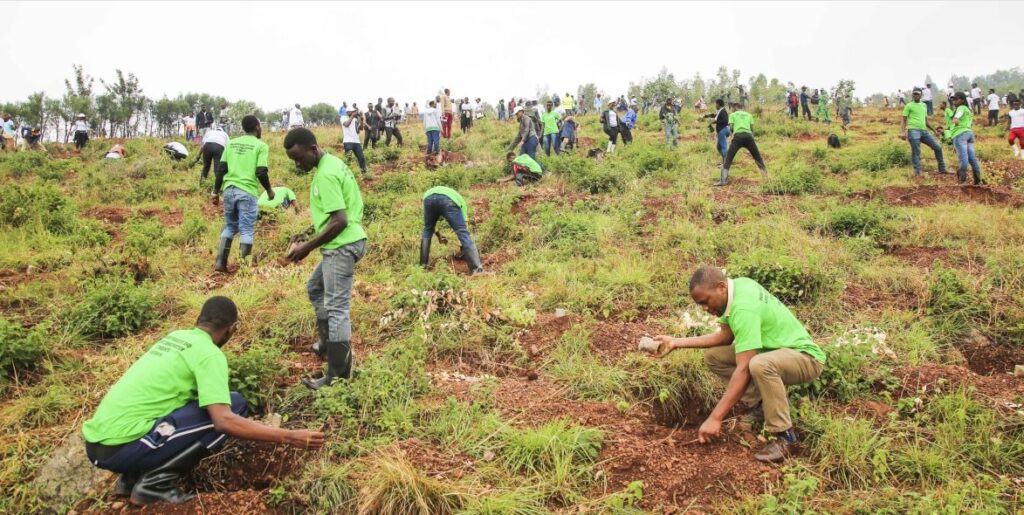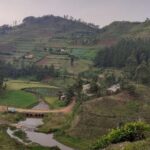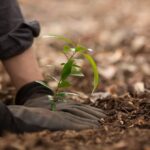City of Kigali officials have made the case to expand forest cover on Mont Jali and its surroundings in Gasabo District, Mont Kigali in Nyarugenge District, and Mont Rebero in Kicukiro District to mitigate floods and improve air quality in Kigali City.
The forests on these three hills have been encroached upon by settlements, increasing the risk of disasters. The City of Kigali has identified high-risk zones, including 2,328 hectares on Mont Jali, 1,658 hectares on Mont Kigali, and 1,350 hectares on Rebero Hill.
Authorities are in the process of determining the precise areas for afforestation and the types of trees suitable for these locations. Experts define high-risk zones as areas with slopes exceeding 30% which accelerates soil degradation and forest depletion.
The degradation of these hilly terrains has heightened the risk of erosion and severe flooding downstream, particularly in Nyabugogo, Gatsata, and the Nyabarongo Valley.
The Economic toll of flooding
The Institute of Policy Analysis and Research (IPAR) has warned that businesses around Nyabugogo River, Gatsata, and other water catchment areas in Kigali could suffer further losses if urgent action is not taken.
A survey on the impact of recurrent flooding on small businesses in Kigali revealed that they experience annual losses amounting to Rwf 178.2 million in direct and indirect damages.
The survey, which included over 360 respondents dealing in car spare parts, general merchandise, and foodstuffs, found that 74% of affected businesses are forced to sell damaged merchandise whenever floods occur.
Vianney Ntakiyimana, an electronics shop owner at Nyabugogo Bus Terminal, recalled losing nearly Rwf 1 million in a single day due to flooding.
“Flooding damaged all my goods, and I had to dispose of them. They included phones, chargers, phone covers, and other merchandise,” he recounted.
Jean Baptiste Kigenza, a business operator dealing in beverages, food, and hygiene products, lost over Rwf 50 million in a single day in 2020.
“I remember we spent an entire week cleaning the shops and trying to salvage the few items that hadn’t been damaged by floodwaters. Unplanned settlements have significantly contributed to the recurring flooding,” he said.
Environmental expert Abias Maniragaba, a lecturer in Environmental Economics at the University of Lay Adventists of Kigali (UNILAK), reiterated that the degradation of Mont Kigali, Jali, and Rebero has exacerbated erosion and severe flooding in low-lying areas such as Nyabugogo and Gatsata.

A three million tree ambition
The City of Kigali is launching a five-year afforestation campaign, “My Tree,” with a goal of planting three million trees in urban areas, including homes, recreational zones, gardens, roadsides, and degraded forests.
Partners such as DHL Global Forwarding and Multilines International Rwanda are supporting the initiative, particularly the planting of fruit trees on Mont Jali in Gasabo District. Forest cover on Mont Jali and Mont Kigali plays a crucial role in reducing flood risks in downstream catchments like Nyabugogo and Gatsata, where many businesses are concentrated.
Beyond flood control, increasing tree cover will enhance soil stability and mitigate surface runoff in areas such as Gikondo, Gatenga, and the Kimisagara-Cyahafi-Nyabugogo corridor.
Emima Nyirabasirimu, a resident who was relocated after losing her home to disasters, welcomed the fruit tree planting initiative.
“Having fruit trees planted in our homes is essential. Right now, we struggle to afford fruits because of high prices, but with these trees, we hope to harvest our own in the near future while also becoming more resilient to landslides and flooding,” she shared.
François Iyamuremye, Executive Secretary of Jali Sector, urged residents to take care of the newly planted trees.
“We encourage everyone to nurture these trees so they can grow, bear fruit, and serve future generations.”
Samuel Dusengiyumva, the Mayor of Kigali, highlighted the broader environmental benefits of the initiative.
“We have a huge task ahead to improve air quality in the City of Kigali, which has been deteriorating. Our interventions include planting three million trees as part of nature-based solutions to manage stormwater and enhance air quality.”
In addition to the three million trees, the city also aims to have each household plant at least five fruit trees, further reinforcing Kigali’s commitment to sustainability and urban resilience




